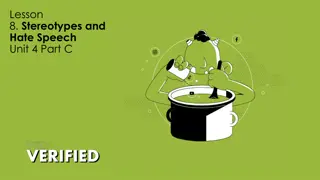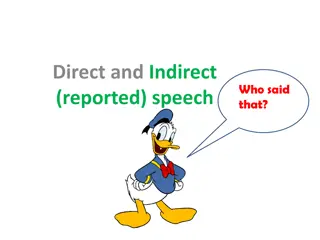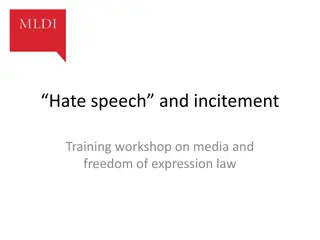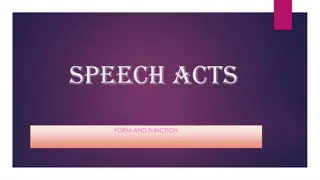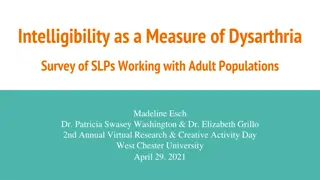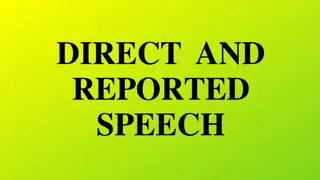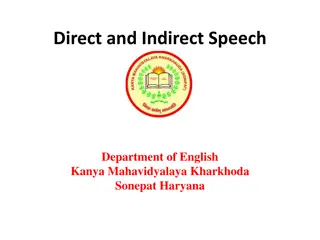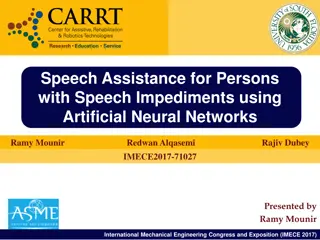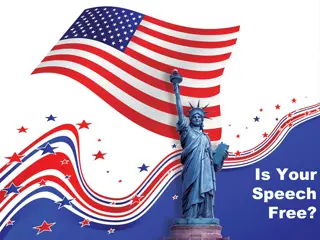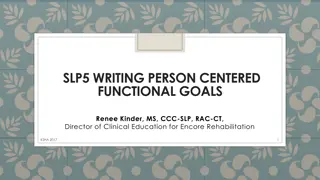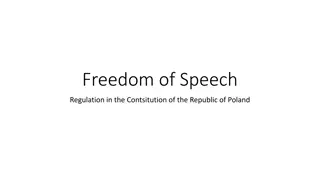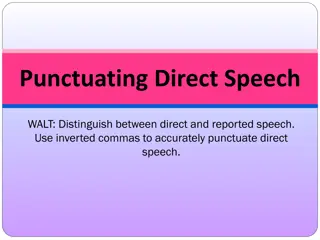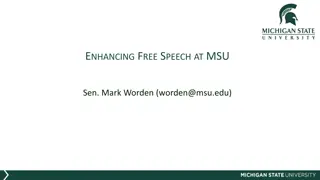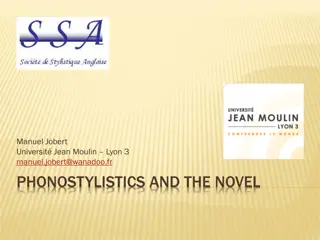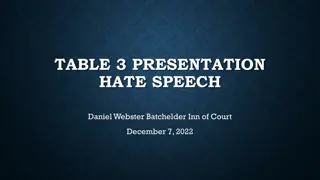Freedom of Speech-Topics 3.5 – 3.6
Delve into the realm of freedom of speech and anonymity through a series of thought-provoking questions on topics like the First Amendment, anonymity, online privacy, and net neutrality. Discover insights on how these concepts intersect with legal rights, law enforcement, and individual expression in the digital age.
Download Presentation

Please find below an Image/Link to download the presentation.
The content on the website is provided AS IS for your information and personal use only. It may not be sold, licensed, or shared on other websites without obtaining consent from the author.If you encounter any issues during the download, it is possible that the publisher has removed the file from their server.
You are allowed to download the files provided on this website for personal or commercial use, subject to the condition that they are used lawfully. All files are the property of their respective owners.
The content on the website is provided AS IS for your information and personal use only. It may not be sold, licensed, or shared on other websites without obtaining consent from the author.
E N D
Presentation Transcript
Freedom of Speech-Topics 3.5 3.6 Are your cell phones OFF?
Reading Quiz! Get your clickers! There are 10 multiple choice questions Each question will appear on a separate slide. Use your clicker to select your answer We ll move to next question in 45 seconds, so respond quickly! Do not look at your neighbors clickers!
Question 1 According to the authors of the First Amendment to the U.S. Constitution, the colonial press and the internet has a lot in common including controversy about anonymity False True A. B.
Question 2 Anonymity is desirable because. It can aid law enforcement investigations People can be candid about discussing their problems Protects individual against identity theft and consumer profiling It can help protect business research and planning More than one of the above A. B. C. D. E.
Question 3 Anonymizer.com Enables law enforcement agencies to access user profiles Enables users to send email and surf the Web anonymously Enables users to participate in discussions with their real names More than one of the above None of the above A. B. C. D. E.
Question 4 Filing a lawsuit to stifle criticism by intimidation and high legal expense is called WELL STAPP SLAPP Exercising Fourth Amendment rights None of the above A. B. C. D. E.
Question 5 The Federal Election Commission (FEC) protects the anonymity of websites, blogs, organizations and individuals If they pay the FEC a certain fee If they get paid for their campaign activities Because the Supreme court ruled that the freedom of speech guaranteed by the First Amendment includes right to speak anonymously in print More than one of the above None of the above A. B. C. D. E.
Question 6 Net neutrality refers to proposed restrictions on how telecommunication companies should treat the all legal content the same way B. interact with their customers subscribed to their internet services C. charge for broadband services D. All of the above None of the above A. E.
Question 7 Companies such as Ebay, Microsoft, Amazon.com and Google pay higher rates so that their content is given greater priority True False A. B.
Question 8 The following is an argument made by an advocate of net neutrality It will slow the advance of high speed internet connection. A few companies can have too much power over content on the internet if the pricing is made flexible. Different levels of service with different charges can pose a threat to free speech. A and B B and C A. B. C. D. E.
Question 9 The following is an argument made by an opponent of net neutrality It will slow the advance of high speed internet connection . Improvements in broadband are necessary for the development of high-definition videos. Mandated uniform pricing is ethical and doest not impact the buyers or sellers free choices A and B A and C A. B. C. D. E.
Question 10 US and European countries are developing laws that will protect the true identity of each users to promote true anonymity. True False A. B.
Review First Amendment divides communication media in three categories o Print media (newspapers, books, magazines, etc) Strongest First Amendment protection o Broadcast (TV, radio) Weaker First Amendment protection, because of a traditional scarcity of broadcast frequencies o Common carriers (telephone, postal system) prohibited from controlling content, and must be available to everyone
Telecommunication Act of 1996: Changed regulatory structure and removed artificial legal divisions of service areas and restrictions on services that telephone companies can provide No provider or user of interactive computer service shall be treated as a publisher of any information provided by another information- content provider
First Amendment was written for offensive and/or controversial speech and ideas. It is a restriction on the power of the government Laws that compel people to avoid legal speech are said to have a chilling effect ; ones with significant chilling effect are unconstitutional When the government pays for an agency, service, or when it owns a communications system, it can choose to restrict speech that would otherwise be constitutionally protected.
Supreme Court principles and guidelines for protected expressions o Advocating illegal acts is legal o Does not protect libel and direct, specific threats o Inciting violence is illegal o Allows some restrictions on advertising o Protect anonymous speech
Obscene speech, which is not protected by the First Amendment: 1. It depicts sexual or excretory acts whose depiction is specifically prohibited by state law. 2. It depicts these acts in a patently offensive manner, appealing to prurient (i.e. having/encouraging an excessive interest in sexual matters) interest as judged by a reasonable person. 3. It has no serious literary, artistic, social, political, or scientific value
CDA of 1996 Anyone who made available to a minor (under 18) an obscene or indecent communication would be subject to a fine of $100K and two years in prison. In 1997, the Supreme Court unanimously ruled that it was unconstitutional on two grounds: o it was too vague and broad ( obscene, lewd, lascivious, filthy, or indecent are not well defined), o and it did not use the least restrictive means of accomplishing its goal to protect children (filtering software would accomplish the goal and be less restrictive).
Child Online Protection Act of 1998 (COPA): Federal crime for commercial web sites to make available to minors harmful material by FCC standards Found to be unconstitutional: o the community standards provision would restrict the entire country to the standards of its most conservative community o requiring adults to provide identification would have a significant chilling effect o Government did not show that COPA was necessary to protect children o Child Online Protection Commission concluded that less restrictive means, filtering, was superior to COPA
Children's Internet Protection Act of 2000 (CIPA): Requires schools and libraries that participate in certain federal programs to install filtering software Libraries must disable filtering software if an adult requests that it be disabled for his/her use. Upheld in court: o Does not violate First Amendment since it does not require the use of filters, impose jail or fines o It sets a condition for receipt of certain federal funds
Spam: What s the problem? o Loosely described as unsolicited bulk email o Mostly commercial advertisement o Angers people because content and the way it s sent Free speech issues o Spam imposes a cost on others not protected by free speech o Spam filters do not violate free speech (free speech does not require anyone to listen) Anti-spam Laws o Controlling the Assault of Non-Solicited Pornography and Marketing Act (CAN-SPAM Act) o Targets commercial spam o Criticized for not banning all spam, legitimized commercial spam
Censorship on global net Global nature of the Internet protects against censorship (banned in one country, move to another) May impose more restrictive censorship (block everything in an attempt to block one thing) Attempts to limit the flow of information on the Internet similar to earlier attempts to place limits on other communications media Some countries own the Internet backbone within their countries, block at the border specific sites and content Some countries ban all or certain types of access to the Internet Companies who do business in countries that control Internet access must comply with the local laws. Google argued that some access is better than no access
Anonymity Anonymity protected by the First Amendment Anonymizing services used by individuals, businesses, law enforcement agencies, and government intelligence services FEC exempted individuals and organizations that are not compensated from election laws that restrict anonymity Supreme Court has overturned state laws that restrict anonymity SLAPP, a Strategic Lawsuit Against Public Participation - lawsuits filed (generally libel) used to obtain the identities (via subpoena) of those expressing critical or dissenting opinions It hides crime or protects criminals Glowing reviews (such as those posted on eBay or Amazon.com) may actually be from the author, publisher, seller, or their friends
Protecting access and regulation Net Neutrality o Argue for equal treatment of all customers De-regulation o Flexibility and market incentives will benefit customers
Poll We prefer a review at the end of every chapter A. B. We prefer the group discussions or other in-class activity. An exam review before the final is good enough.
Thursday in-class activity View Term Project Proposal document online Think about a project focus that interests you Compose a brief pitch to market yourself if you d like to lead a group; you ll be given an opportunity to speak in front of the class. Include any special skills that might benefit a group, e.g., video editing, graphic design, script writing? Bottom line: No student can leave class on Thursday without being in a group
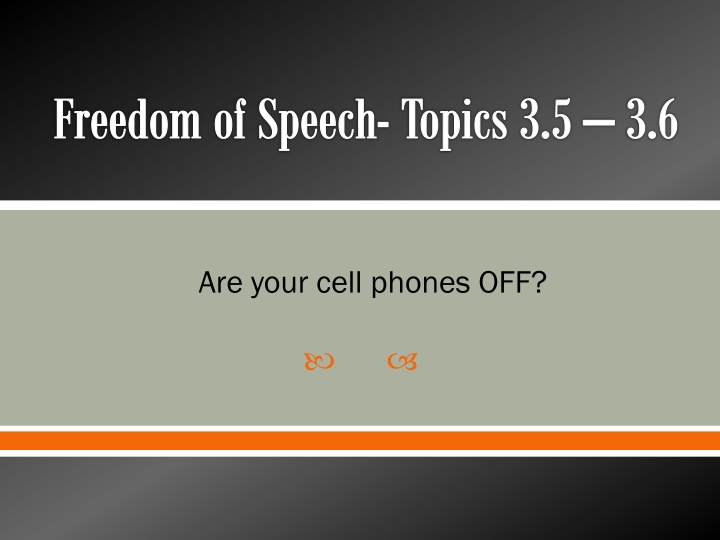

![Prevention and Combating of Hate Crimes and Hate Speech Bill [B.9B.2018]](/thumb/60513/prevention-and-combating-of-hate-crimes-and-hate-speech-bill-b-9b-2018.jpg)



